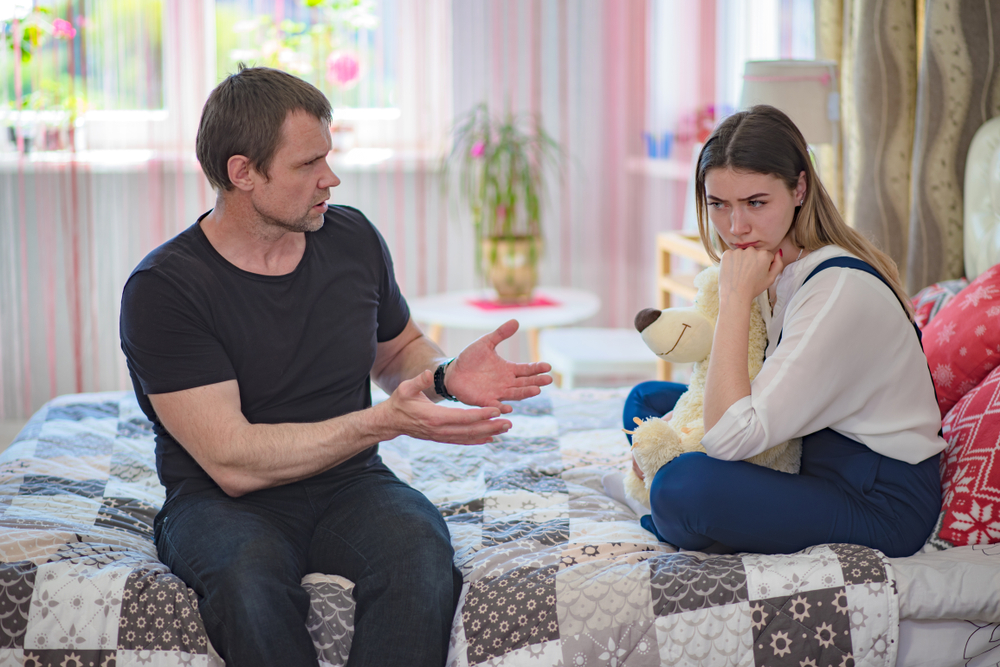Boomer parenting styles, shaped by the cultural and economic realities of the mid-20th century, have left a lasting impact on multiple generations. While many baby boomer parents were well-intentioned and committed to their children’s well-being, psychological research has shown that certain behaviors common to this parenting style can contribute to long-term anxiety in children. These effects are often subtle and can linger well into adulthood, influencing emotional health, relationships, and self-perception. Here are eight subtle ways boomer parenting styles can instill lifelong anxiety, supported by psychological insights.
1. Emotional Repression Was Encouraged

Boomer parents often grew up in environments where emotional restraint was seen as a virtue. Consequently, many of them passed on the belief that expressing strong emotions like sadness, fear, or anger was a sign of weakness. Phrases like “stop crying” or “toughen up” were frequently used, especially with boys, reinforcing the idea that emotions should be suppressed rather than processed.
According to Dr. Susan David, a psychologist at Harvard Medical School, emotional suppression can lead to what she calls “emotional rigidity,” a state where individuals struggle to cope with life’s challenges because they have never learned to process their emotions effectively. This inability to manage internal emotional states is linked with higher levels of anxiety and depression in adulthood.
2. Overemphasis on Achievement and Productivity

Many boomer parents believed that success in school and work would guarantee a stable, happy life. While this belief was grounded in the economic prosperity of the post-war era, it often led to an overemphasis on achievement and a conditional form of praise. Children were often told they were only worthy if they were productive, successful, or better than their peers.
Psychologist Carol Dweck’s research on motivation shows that children raised in environments where praise is contingent on performance develop a fixed mindset. They may internalize the belief that failure makes them unlovable or inferior. This can create a constant sense of pressure and fear of failure, leading to chronic anxiety that persists into adulthood.
3. Lack of Validation for Individual Identity

Boomer parenting often emphasized conformity and adherence to traditional roles. Individual interests or non-normative identities were sometimes dismissed or discouraged. Children who displayed non-traditional behaviors, interests, or values were often pressured to fall in line, whether that meant pursuing a “respectable” career or adhering to gender norms.
This lack of validation can lead to identity confusion, self-doubt, and internal conflict. According to research published in the Journal of Child and Family Studies, children who do not receive affirmation for who they are experience higher levels of anxiety and lower self-esteem. The long-term result is often a persistent feeling of not being “enough” or of having to hide one’s true self to gain acceptance.
4. Conditional Love and Approval

Many children of boomers recall feeling that love was conditional, dependent on good behavior, academic performance, or obedience. While this tactic might have been used to enforce discipline, it inadvertently taught children that their worth was tied to external validation. Over time, this creates a fragile sense of self-worth.
Psychologist Carl Rogers identified unconditional positive regard as crucial for healthy psychological development. When children feel that they are only loved for what they do, not who they are, they may grow into adults who constantly seek approval, fear rejection, and struggle with self-acceptance, all of which contribute to chronic anxiety.
5. Authoritarian Parenting and Control

Boomer parents often adopted an authoritarian parenting style, characterized by strict rules, high expectations, and low responsiveness. While this approach can foster discipline and structure, it can also create an environment of fear rather than trust. Children raised under authoritarian regimes may not feel safe expressing their thoughts or emotions.
A study in the Journal of Adolescent Health found that authoritarian parenting is strongly correlated with increased anxiety and depressive symptoms in young adults. The constant need to please an authority figure or avoid punishment can lead to hypervigilance and internalized fear, patterns that are difficult to break later in life.
6. Neglect of Mental Health Awareness

During the boomer era, mental health was not widely discussed or understood. Many parents dismissed signs of anxiety or depression as laziness, drama, or a phase. Phrases like “snap out of it” or “you have nothing to be sad about” were commonly used, minimizing children’s emotional experiences.
This lack of acknowledgment can lead children to internalize their struggles, believing that their feelings are invalid or shameful. According to the American Psychological Association, invalidating a child’s emotional experiences can impair their emotional development and increase the likelihood of anxiety disorders. Without the tools or language to address their internal struggles, many children grow into anxious adults who do not know how to seek help.
Read More: 7 Parenting Mistakes That Can Weaken a Child’s Mental Health
7. Perfectionism Modeled and Reinforced

Boomer parents often modeled perfectionistic behavior, placing high standards on themselves and their families. They may have presented a façade of perfection to the outside world, leading children to believe that anything less than flawless was unacceptable. This message was often unspoken but powerful, shaping children’s self-expectations.
Perfectionism is strongly linked to anxiety, according to psychologist Dr. Gordon Flett, who has conducted extensive research on the topic. When children internalize the belief that mistakes are catastrophic or that their value is tied to being perfect, they can develop obsessive thoughts, fear of failure, and procrastination. These traits often persist into adulthood, creating a cycle of stress and self-criticism.
8. Avoidance of Vulnerability and Difficult Conversations

Boomer parents often avoided difficult emotional conversations, whether about grief, trauma, or family conflict. Silence was a common response to uncomfortable topics, and children were often left to make sense of events on their own. This avoidance modeled a fear of vulnerability and taught children that discomfort should be ignored rather than explored.
Psychologist Brené Brown’s research highlights that vulnerability is essential for meaningful human connection and emotional resilience. Children who are not taught to engage with their vulnerability may develop anxiety around emotional intimacy and fear of emotional exposure. They may also struggle with internalizing unprocessed emotions, which contributes to chronic stress and a lack of emotional clarity.
Read More: 12 Emotional Signs You Were Raised by a Narcissistic Mother
Conclusion

While boomer parenting styles were often grounded in love, responsibility, and a desire to provide better lives for their children, certain approaches common to that era can have unintended psychological consequences. Emotional suppression, conditional love, authoritarian control, and avoidance of mental health issues are just a few examples of parenting behaviors that may lead to chronic anxiety. Recognizing these patterns is not about assigning blame but about understanding how parenting styles shape emotional development. By increasing awareness of these subtle influences, individuals can begin to heal, develop healthier coping mechanisms, and potentially break the cycle for future generations.
Disclaimer: This article was created with AI assistance and edited by a human for accuracy and clarity.

